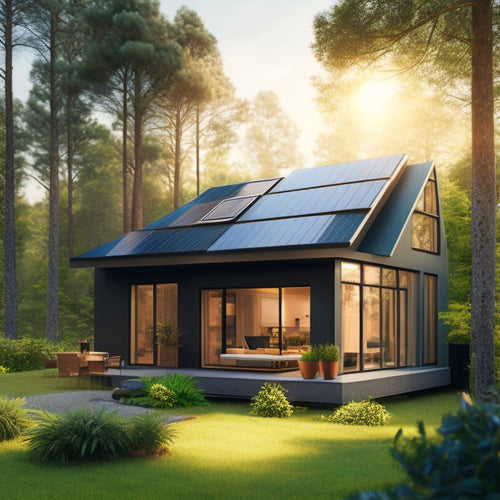
Are Patio Solar Panels Worth It
Share
You're considering patio solar panels to power your outdoor living space, but are they worth it? By incorporating them into your design, you can capitalize on sunlight to generate clean energy, reduce your energy bills, and potentially increase your property value. Patio solar panels offer a range of benefits, including ease of installation, portability, and cost savings. While they do come with initial costs and maintenance requirements, understanding how they work and their drawbacks can help you make an informed decision. As you weigh the pros and cons, you'll want to investigate the specifics of this eco-friendly option further to determine if it's the right fit for you.
Key Takeaways
- Patio solar panels offer substantial energy savings, potentially reducing energy bills by up to 50%, depending on system size and usage.
- While initial installation costs range from $15,000 to $30,000, long-term savings and potential tax incentives can offset the expense.
- Patio solar panels are relatively easy to install and maintain, with minimal tools required and quarterly cleaning costs around $50-$100.
- Despite aesthetic concerns and space limitations, patio solar panels can increase property value and provide a degree of energy independence.
- Although performance may be affected by weather and shading, patio solar panels can still provide a worthwhile investment for eco-conscious homeowners.
What Are Patio Solar Panels
As you begin to investigate the concept of utilizing solar energy, you may come across the term "patio solar panels." These innovative systems are specifically designed to capture sunlight in outdoor living spaces, such as patios, gardens, or decks.
They're a unique way to integrate energy efficiency into your patio design, providing a clean and sustainable source of power.
Patio solar panels are typically mounted on a freestanding structure, such as a pergola or gazebo, allowing you to generate electricity while maintaining the aesthetic appeal of your outdoor space.
These systems often feature sleek and slim designs, making them a subtle addition to your patio. By capturing the sun's energy, you can reduce your reliance on traditional power sources, lowering your energy bills and carbon footprint.
When selecting patio solar panels, consider factors such as panel efficiency, durability, and system compatibility.
It's crucial to choose a system that integrates seamlessly with your existing electrical infrastructure to guarantee peak performance.
Benefits of Patio Solar Panels
One of the most significant advantages of installing patio solar panels is the substantial reduction in your energy bills. You'll generate free electricity from the sun, reducing your reliance on the grid and cutting your energy expenses.
With patio solar panels, you can expect to save up to 50% on your energy bills, depending on the size of the system and your energy usage.
Another significant benefit of patio solar panels is their positive environmental impact. By utilizing renewable energy from the sun, you'll reduce your carbon footprint and contribute to a cleaner, more sustainable future.
Patio solar panels produce no emissions or pollution, making them an attractive option for environmentally conscious homeowners.
In addition to energy savings and environmental benefits, patio solar panels can also increase your property value. Installing a solar panel system can enhance your home's appeal to potential buyers, making it more attractive and desirable.
Patio Solar Panel Costs
You're likely wondering what patio solar panels will cost you.
The system installation prices vary depending on factors like the panel type, size, and installation complexity, with average costs ranging from $15,000 to $30,000.
Additionally, you'll need to take into account ongoing maintenance costs, which can include cleaning, repairs, and replacement parts, to guarantee your system operates at peak efficiency.
System Installation Prices
When it comes to installing patio solar panels, the system installation prices are a significant factor to evaluate.
You'll want to take into account various installation factors that impact the overall cost. The type and quality of equipment, labor costs, and local permits and inspections all play a role.
Comparing prices from different installers is vital. Be wary of extremely low prices, as they may indicate low-quality equipment or incomplete installations.
On average, you can expect to pay between $2.50 and $3.50 per watt, with a typical patio solar panel system ranging from 2 to 5 kilowatts. This translates to a total installation cost of $5,000 to $17,500.
Keep in mind that prices can vary depending on your location, system size, and installation complexity.
It's important to research and compare prices from reputable installers to find the best value for your money. By doing so, you'll be able to make an informed decision about whether patio solar panels are worth the investment for you.
Ongoing Maintenance Costs
As patio solar panels generate electricity, they'll require periodic upkeep to guarantee peak performance. You'll need to verify they're clean, free from debris, and functioning at their best to maximize energy production.
Here's a breakdown of the estimated ongoing maintenance costs:
| Task | Frequency | Cost |
|---|---|---|
| Cleaning | Quarterly | $50-$100 per cleaning |
| Performance Monitoring | Monthly | $10-$20 per month |
| Panel Inspection | Annually | $100-$200 per inspection |
| Inverter Replacement | Every 10-15 years | $1,000-$2,000 per replacement |
You can reduce these costs by adopting simple cleaning techniques, such as hosing down the panels or using a soft-bristled brush to remove dirt and debris. Regular performance monitoring will also help you identify potential issues before they escalate into costly problems. By staying on top of maintenance, you'll verify your patio solar panels continue to generate power efficiently and effectively.
How Patio Solar Panels Work
Most patio solar panels are designed as photovoltaic (PV) systems, which convert sunlight into electrical energy. You're probably wondering how this energy conversion happens. It starts with sunlight absorption, where photons from the sun hit the solar panels.
The panels are made up of many small photovoltaic cells, which are typically made from silicon. When sunlight hits these cells, it excites the electrons, causing them to flow through the material. This flow of electrons is what generates an electrical current.
As you install the patio solar panels, you'll notice they're typically mounted at an angle to maximize sunlight absorption. The panels are connected to an inverter, which converts the DC power generated by the panels into AC power, making it usable for your home.
The AC power is then fed into your electrical panel, where it can power your appliances, lights, and other electrical devices. Any excess energy is fed back into the grid, and you may even receive credits from your utility company.
Patio Solar Panel Maintenance
You've invested in patio solar panels, and now it's vital to confirm they continue generating clean energy efficiently. Regular maintenance is essential to guarantee your patio solar panels operate at their best.
To maximize energy production, you'll need to perform routine cleaning and inspections. Cleaning techniques are significant, as dirt and debris can reduce energy output. You can use a soft-bristled brush, mild soap, and distilled water to clean your patio solar panels.
Avoid using harsh chemicals or abrasive materials that can damage the panels.
In addition to cleaning, you should perform seasonal checks to identify any potential issues. Here are three important seasonal checks to perform:
-
Winter: Inspect your patio solar panels for snow and ice accumulation, and clean them regularly to maintain energy production.
-
Spring: Check for loose connections and tighten them as needed. Also, inspect the panels for any signs of damage or wear.
-
Summer and Fall: Verify that your patio solar panels are securely fastened and confirm that the surrounding area is clear of debris.
Patio Solar Panel Drawbacks
While maintaining your patio solar panels is essential, it's equally important to be aware of the potential drawbacks that can impact their performance and your overall experience.
You should evaluate the efficiency concerns associated with patio solar panels, as they may not be as efficient as traditional rooftop solar panels. This is because patio solar panels are often smaller and may not receive direct sunlight for as many hours of the day. Additionally, their efficiency can be affected by shading from surrounding objects, such as trees or buildings.
Another drawback to evaluate is the aesthetic impact of patio solar panels. You may find that they don't blend in seamlessly with your outdoor decor, which could be a concern if you're particular about the appearance of your patio.
Moreover, patio solar panels can be bulky and may take up significant space on your patio. You'll need to weigh these drawbacks against the benefits of patio solar panels, such as their ease of installation and portability, to determine if they're right for you.
Frequently Asked Questions
Can I Install Patio Solar Panels Myself?
You can install patio solar panels yourself, but before diving in, visualize the setup process: carefully handling fragile panels, climbing ladders, and guaranteeing electrical connections. Heed installation tips and safety precautions to avoid risks and guarantee a successful, efficient setup.
Do Patio Solar Panels Work on Cloudy Days?
You'll find that patio solar panels can still generate energy on cloudy days, albeit with reduced solar efficiency. Although energy production will be lower, you'll still capture some power, even on overcast days, thanks to the panels' ability to convert indirect sunlight into usable energy.
Are Patio Solar Panels Suitable for Apartments?
You're considering balcony solar options for your apartment energy needs. While patio solar panels can generate power, they might not be suitable for apartments due to limited space, noise restrictions, and potential homeowners' association regulations.
Can I Use Patio Solar Panels for Hot Water?
You can utilize patio solar panels to power hot water systems, enhancing energy efficiency while reducing your reliance on traditional power sources; by integrating them into your setup, you'll enjoy a sustainable and cost-effective solution for your hot water needs.
Are Patio Solar Panels Compatible With All Patio Umbrellas?
You'll find that patio solar panels aren't compatible with all patio umbrellas, as their design varies; however, modern solar panels are adaptable, and manufacturers often provide custom installation options to guarantee seamless integration with your patio umbrella's unique structure.
Related Posts
-

Master Advanced Solar Panel Design Online for Free
You can master advanced solar panel design online for free by leveraging specialized courses and training platforms, ...
-

Top Online Stores for Solar Car Accessories
When searching online for solar car accessories, you'll find top retailers like Amazon, REI Co-op, and Best Buy offer...
-

Reduce Solar Panel Cost for Your Small Home
By evaluating your energy needs, choosing the right installer, and selecting cost-effective solar panel options, you ...


